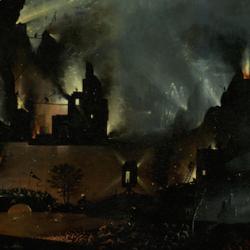Pannenberg’s notion of the ontological priority of the future may be difficult to grasp, but it falls into place when we realize that the scope of his ontology was “reality as a whole.” That may seem to add diffuseness to the vagueness of the original concept, but the two large concepts actually come together coherently.
After all reality as a whole isn’t complete yet. As Christiaan Mostert emphasizes in his God and the Future, since we live in a temporal and historical reality, what exists now is in motion, and “reality as a whole” is still in process of formation. It will be fully formed only at a completion point, only at the end, should there be an end.
Against Hegel, who, Pannenberg thought, didn’t really believe in an open future, he insists on the incompleteness of reality. Pannenberg puts it this way: “The totality of reality does not exist anywhere complete. It is only anticipated as a totality of meaning. The totality which is an essential framework for any item of experience to have a determinate meaning does not exist at any point as a totality; rather, it can only be imagined by transcending what exists at any point. This anticipation, without which … no experience is possible at all, always involves an element of hypothesis, of subjective conjecture, which must be confirmed – or refuted – by subsequent experience” (quoted in Mostert, 75).
This lends a good bit of modesty to our metaphysical conclusions. Pannenberg again: “Any metaphysics, if it is to be taken seriously, can no longer claim the character of a definitive foundation, constructed of concepts, for being and knowledge. Metaphysical reflection must take on the form of a conjectural reconstruction in relation to its object, one which distinguishes itself from its intended truth while at the same time construing itself as a preliminary form of this truth. Its characteristic reflective form will thus have to be more that of anticipation than that of concept in the sense of classical metaphysics. Put more precisely, the philosophical concept will reveal itself to have the structure of anticipation” (quoted p. 76).
Metaphysics must encompass history, and it must be comprehensive. That framework figures, importantly, into Pannenberg’s answer to the problem of evil: It must be answered by the end: “In the face of the horrors of evil every theoretical theodicy would function as an ideological device. There can be only one valid answer to the reality of evil: the eschatological reconciliation of God with his world by that glorification of his suffering creatures which alone will finally prove his true divinity” (quoted, p. 87).
This doesn’t leave us with agnosticism. The end has been disclosed ahead of time in the resurrection of Jesus. God has revealed His final victory, and that enables us to anticipate the end, the total reality of things. Only against the backdrop of this eschatological hope can we have any sort of comprehensive ontology of “reality as a whole.”















